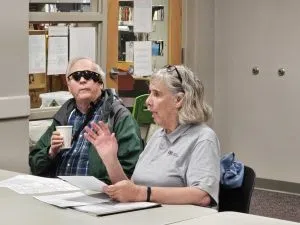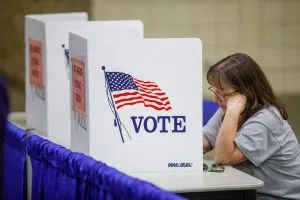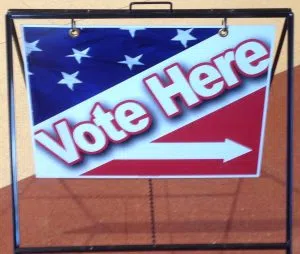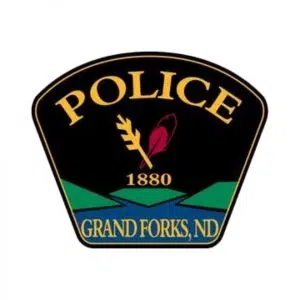
Allan Peterson, left, of the North Dakota Association of the Blind, listens to Carol Sawicki of the North Dakota League of Women Voters on Oct. 12, 2024, in Fargo. Sawicki was providing information about voting in the general election for people with visual impairments. (Jeff Beach/North Dakota Monitor)
(North Dakota Monitor) -Trevor Vannett likes the ease of in-person voting, which is why every election the Bismarck man travels to the polls to cast his vote — with assistance from an election judge.
Vannett has cerebral palsy. This affects his ability to write and to read small-font texts. He relies on state laws that allow any North Dakota voter to ask for assistance in marking their ballot. A voter can also bring a person of their choosing to assist them.
“It’s an easy process, but sometimes you have to advocate for yourself,” he says.
Laws like the federal Help America Vote Act and technology have improved voting access for people with disabilities.
Advocates say now one of the biggest hurdles is educating members of the disabled community that they have the right to vote and a right to vote in the manner that they want – just like any other eligible voter.
And that means they have access to in-person voting.
“To be honest, I hear more positives than negatives when it comes to accessibility,” Vannett said.
When he hears of concerns, it often centers around privacy – being able to vote without others overhearing one’s choices – and transportation to polling sites.
In North Dakota, voters may opt to use an ExpressVote device at the polls. This device follows guidelines set by the Americans with Disabilities Act to ensure independent voting.

Allan Peterson of Fargo has used ExpressVote in the past. He is blind and finds the machine easy to use.
“You put on headphones so nobody knows how you’re voting. Just like anybody else,” he said.
Peterson organizes a support group for people who have lost their sight or have impaired vision. Recently, the Fargo man invited representatives from the League of Women Voters and the state Protection and Advocacy Project to present on voting.
As part of the event, attendees practiced using an ExpressVote machine so they would be more comfortable using it on Election Day.
Peterson doesn’t take the tool for granted.
Earlier this year, a group tried to get a petition on the statewide ballot that would’ve banned voting machines like ExpressVote. They failed to get enough signatures.
Peterson was relieved the idea failed.
“If they had been successful, I wouldn’t have access to a secret, independent ballot,” Peterson said. “This is important for those of us who desire and want a means to vote independently. It’s not a privilege, it’s a right.
Nationally, voter turnout improved among citizens with disabilities in 2020. Their turnout increased by nearly six percentage points from the 2016 general election. This was more than the 5.3 point increase among citizens without disabilities, according to a recent report released by Rutgers University.
Part of the engagement can be traced to improved accessibility, said Brenda Ruehl, director of programming services in the Fargo office of the state Protection and Advocacy Project, which protects the rights of individuals with disabilities.
She also thinks it suggests voter education targeting the disabled community is valuable.
“People with disabilities may feel like they’re not that important. We seek to change that. You’re important and your vote counts,” Ruehl said.
Bruce Klootwyk Jr., usually brings a family member along with him to help him mark his ballot when he votes in Bismarck. He has cerebral palsy, which affects his fine motor skills and makes it difficult to use a pen.
He says it’s important for people with disabilities to show up to the polls. People with disabilities are an important group for politicians to court, he said.
“We’re all trying to live our lives to the fullest, and voting is part of that,” he said. “Anything we can do to make voting easier and more attractive for all of us is a good idea.”









